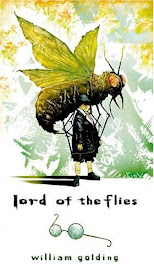I. JimIt was after sun-up, when our raft passed a village. I was dangling my legs in the warm water with a pipe in my hand doing nothin' 'cause it was Jim's turn to cook breakfast. Life is just so good when you've got the full day to enjoy, and everything smelled delicious under the sun (everything did smell good 'cause Jim was actually cooking breakfast).
By-and-by, the time flew by, and all of a sudden, I heard a crash and then comes a h-wack! – bum! bum! bumble-bumble-umble-um-bum-bum-bum-bum - and then all I can hear is dead silence.
"What the heck is goin' on Jim?" I freaked out.
"Dey's numf'n wrong," said Jim in a shivering voice, "I reck'n me jist saw me wife, but ole Jim is not sure."
I turned around and looked ashore. Along the riverside, stood a nigger woman, carryin' a bucket filled with laundries and all that sort of things. She was facin' the other way so I can't reely see her face. Anyway, I stopped the raft, hauled it up onto the shore, and hurried Jim, who was still awfully in shock, to go and check.
'Bout a minute later, I heard Jim cryin', "Goodness gracious, is dat you, Betty?"
"Oh, good lan'! is dat you, honey?", a woman's voice.
"Lemme have a closer look at yer face!" said Jim with tears all over his black face, "Po' niggers can't have no luck. I awluz 'spected dat I gwyne to see yo agin!"
"I knows yo're gonna come ta find me, Jim, I awluz kno'!"
"Jim should've ranaway earlie' "
"Don't you blame yo'self 'bout it."
They walked back to the raft, together. Jim said to Betty, "Lemme introdoss yo to me bes' fren'."
"Dah white boy ove' there?"
" Yea. 'Tis de ole true Huck; de on'y white genlman da ever kep' his promise to ole Jim."
"Hello mistah Huck", said Betty in a weird fearful manner.
"Wat? Plz don't call me mister, I'm just Huck, ole Jim's best friend."
"How did yo' two become fren'?" asked Betty.
"Le sit, le all sit down," said Jim, bringing our breakfast to the table (oh well, it's a big rock actually), "dat's a sooper long story ta tell!"
II. HuckI sneaked out from the opening window, climbed over the fence, and was about to run away from Ms. Rockefeller's house, when I heard someone was talkin' in the backyard, "wat should we do with this girl?"
"Maybe we can just bury her alive here 'cause I don't reckon anyone would notice", said another one.
"Well then, fine. Let's get this done as fast as we can so we can leave before the sunrise."
This is not good, I reckon. Tom Sawyer said that there ain't any book that has a woman got killed in the end; women are s'posed to be rescued by a cowboy or sumf'n like that. Then I'm not s'posed to help that girl out 'cuz I ain't a cowboy - I'm s'posed to be the robber! But that gal will prob'ly get killed if I leave now, so I reckon I'm gwyne to save her anyway 'cuz I will do whichever come handiest at the time.
So I started to crow like a rooster. And of course, my fella robbers ran away immediately. By-and-by, I helped the girl out. Maybe I should stop calling that girl "the girl" 'cuz now I know her name, Sophie. She was gentle and sweet, like a dove, and she was a little younger than me and should be
a lot younger than Jim, I s'posed.
"Who are you?" asked Sophie.
"Oh, I'm Huck Finn... no, I mean-" Duh, why did I forget not to tell her my real name? Damn.
"Thank you so much for saving my life! You are a really brave young man, Huck."
"It's not that big of deal. I'm a robber, just wanna let yo know." I said it with great pride.
"What? A robber? Is that a joke or something?"
"Yup. Anyway, yew wanna go to my raft en get sumf'n to eat? Yo look dog-tired." I offered.
"Since I have no where to go, I would say 'yes'", said Sophie with a delightful smile.
"Well then, follow me", I smiled back. And I was thinkin' 'bout kidnapping her for a ransom or not 'cuz a sly old robber would think dat way.











